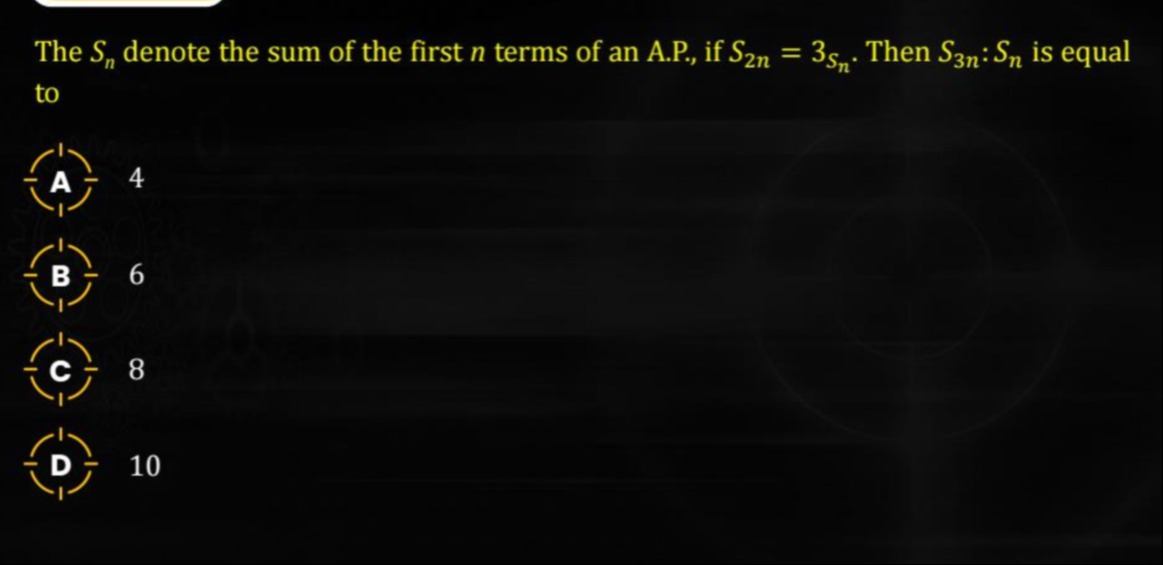Question
Question: The $S_n$ denote the sum of the first $n$ terms of an A.P., if $S_{2n} = 3S_n$. Then $S_{3n}:S_n$ is...
The Sn denote the sum of the first n terms of an A.P., if S2n=3Sn. Then S3n:Sn is equal to

4
6
8
10
6
Solution
Let Sk be the sum of the first k terms of an arithmetic progression (A.P.) with first term a and common difference d. The formula for Sk is given by: Sk=2k[2a+(k−1)d]
We are given the condition S2n=3Sn. Using the formula for Sk: S2n=22n[2a+(2n−1)d]=n[2a+(2n−1)d] Sn=2n[2a+(n−1)d]
Substituting these into the given condition: n[2a+(2n−1)d]=3(2n[2a+(n−1)d])
Assuming n=0, we can divide both sides by n: 2a+(2n−1)d=23[2a+(n−1)d]
Multiply by 2 to clear the fraction: 2[2a+(2n−1)d]=3[2a+(n−1)d] 4a+2(2n−1)d=6a+3(n−1)d 4a+(4n−2)d=6a+(3n−3)d
Rearranging the terms to find a relationship between a and d: (4n−2)d−(3n−3)d=6a−4a (4n−2−3n+3)d=2a (n+1)d=2a
This relation must hold for the given n.
Now we need to find the ratio S3n:Sn. S3n=23n[2a+(3n−1)d]
The ratio is: SnS3n=2n[2a+(n−1)d]23n[2a+(3n−1)d]
Cancel out 2n: SnS3n=[2a+(n−1)d]3[2a+(3n−1)d]
Substitute 2a=(n+1)d into the expression: Numerator: 2a+(3n−1)d=(n+1)d+(3n−1)d=(n+1+3n−1)d=4nd Denominator: 2a+(n−1)d=(n+1)d+(n−1)d=(n+1+n−1)d=2nd
So, the ratio becomes: SnS3n=[2nd]3[4nd]
Assuming n=0 and d=0 (if d=0, then a=0, leading to trivial sums), we can cancel nd: SnS3n=23×4=212=6
Thus, S3n:Sn=6.
Alternative Method: Let U1=Sn. Let U2=S2n−Sn. Let U3=S3n−S2n.
The sums of consecutive blocks of n terms in an A.P. form another A.P. We are given S2n=3Sn. So, U2=3Sn−Sn=2Sn. Thus, U1=Sn and U2=2Sn. Since U1,U2,U3 form an A.P., the common difference is U2−U1=2Sn−Sn=Sn. Therefore, U3=U2+(U2−U1)=2Sn+Sn=3Sn.
Now, S3n=U1+U2+U3=Sn+2Sn+3Sn=6Sn. The ratio S3n:Sn=6Sn:Sn=6.
